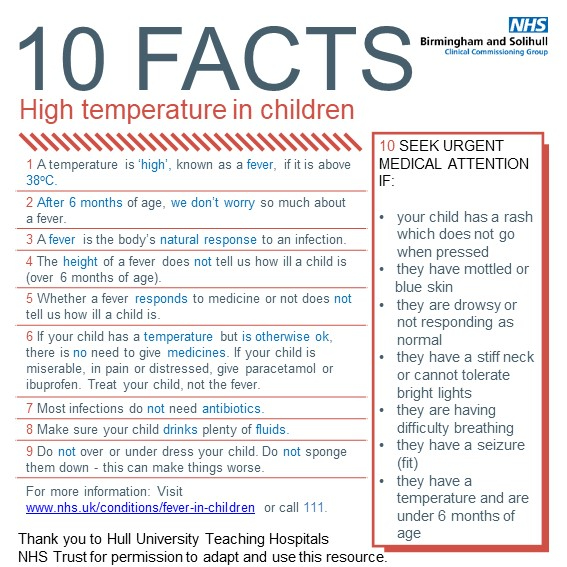Every parent or carer wants to know what to do when a child is ill.
The Guide for Parents and Carers of children from 0-5 - common childhood illnesses will help you to care for your child at home, to know when to call the GP and when to contact the emergency services.
Being poorly is an everyday part of growing up, which can be helped with a chat with your health visitor or midwife. Almost all babies, toddlers and children aged up to five will also get the most common childhood illnesses like chickenpox, colds, sore throats and ear infections. While these are not very nice at the time, they are easy to treat with a visit to your doctor and then cared for at home.
This handbook has been put together with help from doctors. If you are worried you must get further advice. Trust your instincts - you know your child better than anybody else.
More often than not something that can cause worry, like a high temperature, can be caused by a cold, which can often be sorted out with a quick trip to your local pharmacy. It is so easy to panic and rush your child to Accident & Emergency (A&E) when they might just have a simple cough or cold which can be treated at home. If you are worried, you must of course go and see your doctor - but finding out a little more about the common, everyday illnesses will help you learn more about what to do and where to go to get help.
- Download A Guide for Parents and Carers of children from 0-5 years - common childhood illnesses
- Visit Birmingham Forward Steps, a pioneering health and wellbeing initiative for all Birmingham children aged 0-5 and their families
You can also watch a video of local GP, Dr Mike Baker, talking about childhood health:
Birmingham Women's and Children's Hospital has shared some top tips from their emergency department, providing some advice on common childhood illnesses and injuries.
Parents are usually good at noticing when something is wrong with their baby from quite early on. It is normal to worry that you won’t recognise the signs that your baby is unwell. Trust your instincts - you know your baby better.
Watch a video of local GP, Dr Mike Baker, talking about childhood health and tummy bugs. You can also get further information on diarrhoea and vomiting from the NHS website.
There are some good things about children catching a few coughs and colds, as it helps them to build up natural defences and fight off viruses.
Most bugs will run their course without doing any real harm because they are viruses which get better on their own, but there are things you can do at home to help.
Crying is natural - it's your baby's way of letting you know they need something or are uncomfortable. They may need their nappy changed, they may be hungry or just need a cuddle.
It's important to remember to burp your baby after a feed as this will help to get rid of their wind and make them more comfortable.
- Crying babies support
- Crying - a short guide for parents
Babies may develop some sort of ear problem at certain times. Most children have grown out of ear infections by the age of seven. Most ear infections are caused by a virus which will get better by itself and will not need antibiotics.
It’s common for babies to be sick in the early weeks as they get used to feeding and their bodies develop.
You can tell when your baby is vomiting, rather than just bringing up small amounts of milk, because there will be a lot more coming out. It can be frightening for your baby, so they are likely to cry.
A temperature is 'high', known as a fever, if it is above 38 degrees. Read our 10 facts - high temperature in children to find out more.

Severe Combined Immunodeficiency (SCID) and BCG vaccinations
The most up to date patient leaflets on Severe Combined Immunodeficiency (SCID) and BCG vaccinations can be found below:
- SCID leaflet - English
- SCID leaflet - easy read
- Newborn Screening for SCID - Easy Read
- Quick links for SCID and BCG
- How will my baby get a BCG vaccination?
These are also available in the following languages: